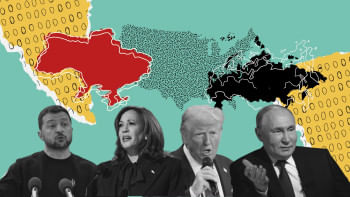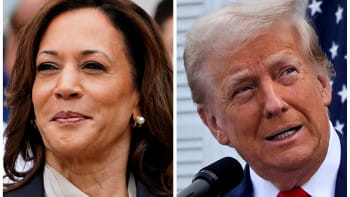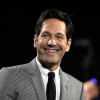Divided nation chooses US president in a bitter, closely fought race

So here we are, at the end of a fevered political season in a bitterly divided nation. Accusations from opposing camps have been flying thick and fast in a vitriolic presidential campaign. Polls show a neck-and-neck race for the White House.
"The presidential race appears to be hurtling toward a photo finish, with the final set of polls by The New York Times and Siena College finding (Democratic candidate) Vice President Kamala Harris showing new strength in North Carolina and Georgia as (Republican candidate) former President Donald J Trump erases her lead in Pennsylvania and maintains his advantage in Arizona," the newspaper breathlessly informed us on November 3.
Today, Americans go to the polls to choose their president, as well as winners in a slew of Congressional and local races. The US and the world await their verdict with bated breath.
Yet, like many things in life, Election Day isn't what it used to be. Thanks to many states that allow people to vote early, possibly more than half the voters have already cast their votes. Given the huge number of mail-in votes in a race expected to be decided by a razor-thin margin, it could well be several days before we know who will be inaugurated in January as the 47th president of the US. Expect plenty of drama from the Trump campaign if he is behind.
In fact, before going into the politics of this election, it's worth pondering a statistical oddity. The US is likely the only democracy where a presidential candidate can win the popular vote and still lose. Spare a thought for Hillary Clinton, the Democratic candidate who lost to Trump in 2016 despite winning the popular vote by several million votes.
Every four years, a bemused world is reminded that the US president is elected by an archaic system of "electoral votes," which are won essentially state-by-state. This also means that instead of campaigning across the whole country, the presidential race is fought in a handful of battleground states. No Republican or Democratic candidate with any sense bothers spending substantial resources or time in many huge states like California, New York, Texas or Louisiana. The first two vote reliably Democratic; the latter are equally reliably Republican.
Consequently, out of all the 50 states, the good folks of Arizona, Georgia, North Carolina, Nevada, Michigan, Pennsylvania and Wisconsin had the dubious privilege of confronting the full blast of this year's presidential campaign. Deep-pocketed Political Action Committees buried their mailboxes with an avalanche of campaign junk mail; both campaigns saturated TV broadcasts and YouTube with dark pronouncements of how the end of the world was nigh if the other candidate got elected; and their evening dinners were liberally peppered with phone calls from political telemarketers.
A tight contest
So, what is this election all about? Harris supporters would have you believe that this is an existential battle to save the constitution and the rule of law. Trump, they say, is a lawless felon, with the frailest possible relationship with the truth. He is also an autocrat to boot who will destroy constitutional rule.
Trump supporters heartily pooh-pooh such warnings as mendacious hyperbole. It is the Democrats, they will tell you, who are a coddled, wealthy, and privileged clique who are obsessed with identity politics, while they have a total disconnect with mainstream US. They are hell-bent on pushing their intolerant liberal "woke" ideology down the throats of the US, Republicans are apt to add.
Beyond partisan politics, three issues are particularly important this time around: the state of the economy, abortion rights, and immigration.
Trump has an edge on the issue of who is better for the economy, given broad public unease with the current inflation. However, with recent news of job creation, rise in wages, and inflation being under control, Harris has narrowed the edge.
It is on abortion rights that Democrats have a more substantial edge, and they are milking it for all it's worth. Republicans deserve this fate; they tried to be cute and are now getting their comeuppance. For decades since the federal right to abortion was guaranteed by the landmark 1973 case of Roe vs Wade, the Republican Party has wooed religious conservatives with the promise to overturn the case. After Trump got conservative justices into the Supreme Court, that's exactly what happened.
But something funny has happened along the way. The issue has now become an albatross around the Republicans' neck.
The backlash has been extraordinary. Even voters in ruby-red states like Kansas and Kentucky have voted to protect abortion rights, as the Trump campaign finds itself looking at a yawning gender gap. Polls show men favour Trump, but women favour Harris by a far more substantial margin. Trump, canny reader of the public pulse that he is, has taken a position that is less than a ringing endorsement of the anti-abortion camp. He says he wants abortion to be determined at the state level.
However, ghastly anti-abortion laws in some states have given this issue particular urgency for women, and polls indicate it might even be eating into support for Trump among non-college White women, a critical constituency of his. In such a close contest, this could tip the race.
Immigration, on the other hand, is a big political advantage for the Republicans. News of illegal immigrants entering the US in massive numbers through its southern border has caused considerable alarm. Republicans have been only too happy to blame Democrats. In a nation where Whites warily eye demographics which indicate they will become a minority before the middle of the century, the issue strikes a chord.
However, while Republicans benefited enormously from the issue, recent gaffes may come back to haunt them. Subtlety and grace have never been Trump's strongest suits. This fact was brought home with stunning clarity during his debate with Harris in September, when he railed against illegal immigration. He made the extraordinary claim (without an iota of proof, as is his wont) that Haitian immigrants in Springfield, Ohio, have been stealing and eating pet cats and dogs. (Springfield officials have denied the claim. Haitian immigrants are there legally.)
This ethnic insensitivity was on grotesque display at his closing rally in New York City's Madison Square Garden on October 27.
"A comic kicked off the rally by dismissing Puerto Rico as a 'floating island of garbage,' then mocked Hispanics as failing to use birth control, Jews as cheap and Palestinians as rock-throwers, and called out a Black man in the audience with a reference to watermelon," The New York Times reported.
"Another speaker likened Vice President Kamala Harris to a prostitute with 'pimp handlers.' A third called her 'the Antichrist.' And the former Fox News host Tucker Carlson mocked Ms Harris—the daughter of an Indian mother and a Jamaican father—with a made-up ethnicity, saying she was vying to become 'the first Samoan-Malaysian, low IQ former California prosecutor ever to be elected president.'"
Reports indicate Puerto Ricans are furious, and there are enough of them in Pennsylvania, a vital battleground state, to influence the race.
But what about the domestic challenges?
For all the sound and fury, one has the disquieting feeling that the nation's actual challenges are not being identified or addressed in a meaningful way.
The US faces extraordinary challenges. Domestically, a huge disaffected working-class White population is caught in an economy where manufacturing has hollowed out. People are increasingly losing faith in the establishment.
Globally, the rise of the Global South in alliance with China and Russia under the rubric of BRICS suggests a more complex multipolar world where many countries are less inclined to kowtow to US diktats. This growing divide is quite alarming for the US from a purely economic point of view. Countries with flourishing economies and booming populations strongly suggest that the future is with BRICS; while the US and its predominantly Western allies with ageing populations are left to reflect on the twin foreign policy disasters of the Russia-Ukraine war and the unconscionable slaughter of Arabs by Israel in Palestine and Lebanon.
MIT Professor Daron Acemoglu, this year's Nobel laureate in economics, is glum.
"There is a storm approaching, and Americans are not prepared," Acemoglu recently wrote in The New York Times. "Barreling toward us are three epochal changes poised to reshape the US economy in coming years: an aging population, the rise of artificial intelligence and the rewiring of the global economy." Acemoglu laments that although these challenges can be used to unleash opportunities if handled correctly, these issues aren't getting the attention they deserve.
These economic challenges come at a particularly fraught time when political moorings of the US are beginning to buckle. A substantial section of Republicans is convinced that the system is gamed; they no longer trust American institutions—the government, the judiciary or the media—to treat them fairly.
While much of this is driven by partisan fearmongering and outright mendacity, the scepticism is real.
Wendy Brown, social science professor at the University of California at Berkeley, says that while Trump has led Republicans in this direction, the fault lies with the liberal establishment that leads the Democratic Party.
"Trump is (a) symptom, not (a) cause, of the 'crisis of democracy.' Trump did not turn the nation in a hard-right direction, and if the liberal political establishment doesn't ask what wind he caught in his sails, it will remain clueless about the wellsprings and fuel of contemporary antidemocratic thinking and practices." Brown told The Boston Review. "It will ignore the cratered prospects and anxiety of the working and middle classes wrought by neoliberalism and financialisation; the unconscionable alignment of the Democratic Party with those forces for decades."
Democrats, she said, ignore at their peril "neoliberalism's direct and indirect assault on democratic principles and practices … and mounting anxiety about constitutional democracy's seeming inability to meet the greatest challenges of our time … the climate catastrophe and the devastating global deformations and inequalities emanating from two centuries of Euro-Atlantic empire."
Whoever wins the presidency will have to take on these challenges.
Who will win?
So, who is it going to be? The short answer, of course, is that nobody has any idea. Pollsters are hedging their bets, Democrats are freaking out, and hardcore Republicans are warning that all hell will break loose if the election is "stolen," i.e. if their candidate loses.
American University historian Prof Allan Lichtman fearlessly treads where no pollster will go. Way back in September, he said Kamala Harris will win the presidency.
Lichtman has a formidable record: he has correctly predicted nine of the last 10 US presidential elections. Lichtman devised the metrics he uses for his election forecast more than three decades ago with the help of an earthquake specialist and mathematician from Moscow named Vladimir Keilis-Borok. The system uses 13 true-or-false statements rooted in historical analysis about the state of the country, the parties and the candidates to determine who will win. He has little use for pollsters and says it is governance, not this or that hot political story of the day, that determines who wins the presidential race.
My own gut feeling is different. It's not based on a study of history or fancy mathematical models or analyses of polls. It's simply the notion that across a wide swath of the US, I don't think people are ready to vote for a mixed-race American woman. (A caveat is in order here: I was confident Hillary Clinton would win in 2016.)
Who is right? We are about to find out.
Ashfaque Swapan is a writer and editor based in Atlanta, US.
Views expressed in this article are the author's own.
Follow The Daily Star Opinion on Facebook for the latest opinions, commentaries and analyses by experts and professionals. To contribute your article or letter to The Daily Star Opinion, see our guidelines for submission.

 For all latest news, follow The Daily Star's Google News channel.
For all latest news, follow The Daily Star's Google News channel. 











Comments